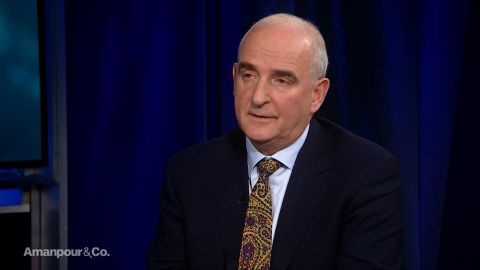Read Transcript EXPAND
CHRISTIANE AMANPOUR: But are you surprised that the whole ISIS take two, if you like, is unfolding right now, what to do with the foreign fighters and brides?
AIMEN DEAN, FORMER AL-QAEDA MEMBER-TURNED BRITISH SPY: After the conflict we have the same problem. In fact, after the Soviet invasion of Afghanistan ended and the fall of the communist regime in Kabul, many of the veteran, you know, volunteers of the Afghan Jihad returned back home and they started the campaign of terrorism and many countries, including Algeria and Egypt. And as a result, basically, this is not a new phenomenon but at the time, there weren’t many Europeans. Now, we have Europeans.
AMANPOUR: Well, that’s the case, right, Peter Neumann, and you study here at the university and you’ve set up this center and you really watch this quite a lot. That makes a big difference, I guess to us, because we’re in Europe and we’ve seen this spate of terrorism —
PETER NEUMANN, PROFESSOR OF SECURITY STUDIES, KING’S COLLEGE LONDON: Yes.
AMANPOUR: — in Europe for the last several years.
NEUMANN: So, it’s been the most significant mobilization of Jihadist foreign fighters that has ever happened. It’s estimated that between 5 and 6000 Western Europeans have gone to Syria and Iraq. And, of course, going back to your question, they have not only been returning since recently, they have been returning for years. So, for example, British government estimates that already 400 are back in the country. So, when President Trump tweeted this weekend, it wasn’t him causing this situation. He was prompting or dressing something that’s been happening for a number of years. Now, it’s become more urgent now because everyone fears that this Kurdish-Syrian autonomous region is going to collapse and that a lot of people that are currently in the captivity of the SDF, of the Kurds, in Syria are going to be free.
AMANPOUR: So, those, of course, are the U.S. allies who are fighting ISIS on the ground. And as you say, what’s to become of these people if that whole area —
NEUMANN: Exactly.
AMANPOUR: — falls apart. So, let’s just take it piece by piece. You said they’ve come back to Britain, you know very, very well, both of you, from different vantage points, how Britain has been dealing with this, you know, historically as well. I just want to quote you the home secretary, Sajid Javid, who said just this week, “As home secretary, my priority is to ensure the safety and security of this country and I will not let anything jeopardize that. These are not judgments to be taken based purely on emotion and empathy. We look at the facts of each case, the law and the threat to national security.” So, he’s really reacting, Aimen, to Shamima Begum, who — 19-year-old girl, she went to with 15, you could say, well, she was misguided, but she doesn’t seem to be saying she was misguided, that she went willingly, that she went knowing what was going on and she even supported beheadings and things because she thought it was Islamically acceptable.
DEAN: Well, I remember when I went to Bosnia, I was 16 and I knew what I was doing.
About This Episode EXPAND
Christiane Amanpour speaks with Peter Neumann & Aimen Dean about the aftermath of ISIS’s defeat; and Roger Cohen about European/U.S. relations. Michel Martin speaks with Kate Bowler about her new memoir “Everything Happens for a Reason: And Other Lies I’ve Loved.”
LEARN MORE


